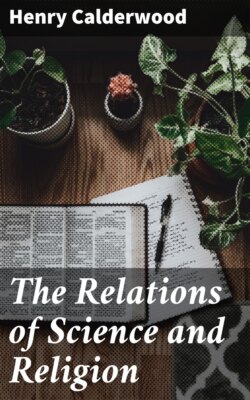The Relations of Science and Religion

Реклама. ООО «ЛитРес», ИНН: 7719571260.
Оглавление
Calderwood Henry. The Relations of Science and Religion
The Relations of Science and Religion
Table of Contents
PREFACE
LECTURE I
Footnote
LECTURE II
Footnote
LECTURE III
Footnote
LECTURE IV
Footnote
LECTURE V
Footnote
LECTURE VI
Footnote
LECTURE VII
Footnote
LECTURE VIII
Footnote
APPENDIX
I. Relations of Science and Religion. Page 34
II. Spontaneous Generation. Page 54
III. Energy and Force. Page 96
IV. All Organized Existence is Constructed on a Common Plan. Page 131
V. Embryology. Page 131
VI. Non-advancement of Lower Orders. Page 158
VII. Protoplasm. Page 131
VIII. Number of Species of Insects. Page 193
IX. Fertilization of Flowers by Insects. Page 170
X. Ants. Page 192
XI. Likeness of the Ape's Brain to the Human Brain. Page 225
XII. The Large Sized or Multipolar Cells. Page 257
XIII. The Conception of Duty. Page 273
NEW BOOKS
Отрывок из книги
Henry Calderwood
The Morse Lecture, 1880
.....
But taking the Christian religion as the crown and centre of religious life in the world, we have a more full and commanding testimony as to the glory of the divine nature, and the genuine exercises of a religious life. He is God creating and sustaining all, ruling in righteousness, revealing himself in Jesus Christ, whose glory is "the glory as of the only begotten of the Father full of grace and truth." He is a God seeking the reconciliation of the guilty with himself. He is a God of mercy, calling all intelligent creatures to fellowship with him, and requiring them all to be "holy even as he is holy." Such is a summary of the teaching of Scripture as to the Divine Being, and our relation to him. Thus are we guided in our utterance before him, "O Lord of hosts, God of Israel, that dwellest between the cherubim, thou art the God, even thou alone, of all the kingdoms of the earth: thou hast made heaven and earth" (Isa. xxxvii. 16).
I content myself with a mere summary; for a full knowledge we must take the Bible itself, knowledge of which must be presumed as the condition of criticism, though criticism has been abundant which has borne witness to ignorance of the revelation criticised,—ignorance so marked that had it applied to science it would have been held a proof of incompetence for criticism. We are now to take the Bible representation of God, and of his relation to us; and on the other hand of man's faith in him, and spiritual devotion and service. These are the materials to be harmonized with the teachings of science, by demonstrating that the testimony of science points to a government of the universe harmonizing with the testimony of Scripture. And here it is needful that there be explicitness, that our thesis may be placed beyond doubt. The purpose is not merely to show that science lays no foundation for denial of a Supreme Intelligence, or for an atheistic conception of the universe; nor merely that it affords no place for belief in Deity without knowledge of his nature, for utterance of an empty name, without intelligible content, or an agnosticism, which affects to celebrate the praises of Ignorance, in homage to the name of science; nor merely an immanent or indwelling Deity, who is in all things, and all things in him, so that he is the unifying power, the soul and life of all that is, including those strange contrasts which we call good and evil; but passing all these representations as strange and alien to the Bible, to show that religion and science find their harmony in recognition of a Transcendent Deity, a personal Deity, distinct from the universe,—a personality ruling in righteousness, and delighting to meet the desires of intelligent beings longing after the perfection of holiness.
.....